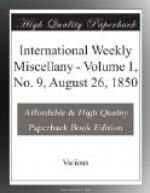France, Russia, Prussia, and other countries, have introduced the Hussars into their armies; but these soldiers are merely Russian, French, and Prussian cavalry, dressed in the Hungarian laced jacket: they want the spirit, the horse, and—the ‘Magyar Isten.’ For this reason, the Hungarian Hussar will not acknowledge them as brethren; and whenever he comes in contact with foreign Hussars, he lets them feel in battle the full force of his contempt. A story is told, that during a campaign against the French in the war with Napoleon, the bivouacs of the Prussian and Hungarian Hussars were near to one another. A Prussian came over to his neighbors in a familiar way with a glass of wine, and drank it to the health of his ‘brother hussar.’ But the Hungarian gently pushed the glass back, and stroked his beard, saying, ‘What brother?—no brother—I hussar—you jack-pudding.’
This expression is not to be mistaken for a brag. The Hungarian hussar is no fanfaron like the French chasseur, but he is conscious of his own powers, like a Grenadier of the Old Imperial Guard. The dolmany, the csako, and the csizma, have grown to his body; they form his holyday dress even when off duty—the national costume transferred into the army; and as he is aware that this is not the case in other countries, the foreign Hussar’s dress is in his eyes a mere servant’s livery; and logically the man is not altogether wrong.
The Hussar, like the Magyars in general, is naturally good-tempered. The finest man in the service, he is at the same time the most jovial companion in the tavern, and will not sit by and empty his glass by himself when a Bohemian or German comrade at his side has spent all his money. There is only one biped under the sun who is in his eyes more contemptible and hateful than any animal of marsh or forest. This is the Banderial Hussar—that half-breed between Croat and Magyar, that caricature of the true Hussar, who serves in the cavalry, as the Croat in the infantry, of the Military Frontier. Never was an Hungarian Hussar known to drink with a Banderial Hussar; never will he sit at the same table: if he meets a snake he crushes it under foot—a wolf he will hunt in the mountains—with a buffalo he will fight on the open heath—with a miserable horse-stealer he will wrestle for a halter; but as for the Banderial Hussar, he spits in his face wherever he meets him.
It was at Hatvan, or at Tapjo-Bicske, that Hungarian and Banderial Hussars were for the first time in this war—the first time perhaps in the recollection of man—opposed to one another in battle. If looks could slay, there would have been no need of a conflict, for the eyes of the Magyars shot death and contempt at their unworthy adversaries. The signal of attack sounded; and at the same instant, as if seized by one common thought, the Hungarian Hussars clattered their heavy sabres back into the scabbard, and with a fearful imprecation, such as no German tongue could echo, charged weaponless and at




